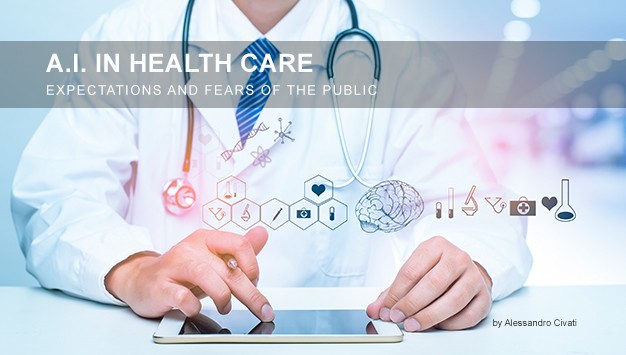In the last decade, we have seen the increased use of AI in the health care sector. With the adoption of big data and AI in health, the public has hopes and fears about health data use. According to most people, health data is an asset that should be used for research purposes and that should be handled with privacy. The public has fears about commercial motives with the adoption of AI and risks associated with health data use. The other worry concerning the adoption of AI is the potential for job losses within the health sector. Let’s have an in-depth look at the public areas with high hope for use of AI in health care and some of their expectations and fears.
Keeping Healthy and Well
The most significant benefit of AI has been helping people stay healthy and making fewer visits to the hospital. We are seeing widespread use of AI and the internet of medical things in consumer health applications and driving people to live healthy lives. Apps are encouraging people to adopt healthier behaviors and have a proactive role in managing healthy lifestyles. AI is placing consumers in charge of their health and overall wellbeing.
On the other hand, AI is helping health professionals better understand the daily needs and lifestyle patterns of their clients/patients. Health professionals can offer better guidance, feedback, and support in keeping healthy with the collected information.
Early Detection and Diagnosis
AI is offering breakthroughs in the early detection of diseases such as cancer accurately and in the early stages. The use of AI in the review and translation of mammograms leads to accuracy in diagnosis by up to 99% accuracy and 30 times faster. In effect, it is eliminating the wrong diagnosis and reducing unnecessary biopsies. The use of consumer wearable in combination with AI leads to the detection of early-stage heart disease. These devices help doctors detect and prevent life-threatening episodes, undertake effective monitoring, and treat illness when still possible.
Watson for Health by IBM assists healthcare organizations in applying cognitive technology to unlock vast amounts of health data and use it to power diagnosis. Watson can review and store vast amounts of medical information from across the world faster than any human. DeepMind Health by Google is helping health researchers, clinicians, and patients address real-world healthcare problems. The technology behind DeepMind employs machine learning and neuroscience to build learning algorithms that mimic the human brain.
Decision Making and Treatment
For substantial improvements in the healthcare field, there must be an alignment of big health data with timely and decisive decisions. The predictive analysis using AI helps support clinical decision-making and actions. Pattern recognition is used to identify patients at risk of developing conditions due to environmental factors, lifestyle choices, and genomics closely monitored and analyzed through AI.
Besides scanning health data to identify at-risk individuals, AI is increasingly being used to take a more comprehensive approach to disease management, improve coordination of care plans, and assist patients in managing and complying with long-term treatment programs. AI has heralded the increased use of robots in the medical field. We see highly complex surgical robots that help surgeons in the operating room or independently execute surgical operations. Robots are also being used for repetitive tasks in hospitals and labs, physical therapy, and support people with chronic conditions. People are living longer compared to previous generations raising the importance of end-of-life care. Robots have a tremendous impact on end-of-life care, especially improving independence and supporting people with heart failure, osteoporosis, and dementia. The advancement of humanoid design will help hold conversations and social interactions, keeping aging minds sharp and eliminating loneliness.
Research and Training
AI in health care plays a critical role in cutting short the research lab path to patients, which is usually long and expensive. AI application in drug research and development in streamlining processes and drug discovery effectively cuts the time between lab and market and brings down costs. Traditionally, it takes about 12 years for a new drug to transition from research lab to human use. Only 5 out of 5,000 medicines in development make it to the human testing stage, and it will cost approximately US$360 million to develop a drug ready for human use.
In training, AI is transforming learning since it can provide realistic simulations. AI can draw from many health databases to inform decisions, respond to questions, and offer trainees advice. AI improves learning outcomes and needs by building and adjusting based on previous challenges and responses. Finally, training can be undertaken anywhere with AI without limitation to a classroom or hospital setting.
Some fears that people have with AI are:
Robots
Some people have negative views about robots being used in healthcare. The overriding fear is that something may go awry with robots causing wanton damage and posing risks to humans. Not all people would be ready to have a robot perform surgery on them or interact with one during a hospital visit.
Ethical Issues
Increasing the use of AI in health care may threaten patient preference, privacy, and safety. Several people feel that AI is used to monitor their behaviors, lifestyle choices, and health status. Privacy is a primary concern with people fearing that their health data could be sold to third parties or used for purposes that they may not agree to. There’s an urgent need for the identification of ethical challenges and their mitigation. However, current policy and ethical guidelines for AI use in healthcare are lagging behind the progress AI has made in diagnosis, clinical decisions, biomedical research, medical education, and robotics.
The above article shows the expectations and fears of the public for AI in health care. There’s an urgent need for the identification of ethical challenges and their mitigation.

Author: Alessandro Civati
Email: author.ac@bitstone.net
LIPP (Lirax Intellectual Property Protection): https://lrx.is/eFzZDjCxTK






